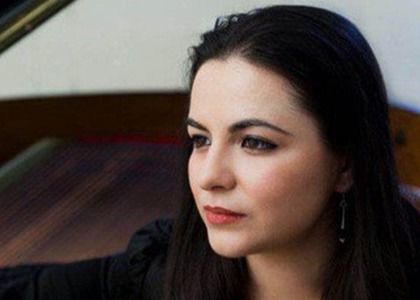> [Archived] Interviews

Interview with pianist Ana Silvestru, who organised the "Concert of the Friendship between James Joyce and Constantin Brâncuși"
On Saturday, 19th February 2022, to celebrate the "Constantin Brancuși" National Day, the "Concert of the Friendship between James Joyce and Constantin Brancusi" will take place on the stage of Sala Radio. An event to celebrate the friendship between the two great artists, performed by pianist Ana Silvestru, who organised the concert, and her guests - cellist Paul Handschke, violinists Cosmin Bănică, Rafael Butaru and clarinetist Emil Vișenescu
Find out more about the concert in this interview with pianist Ana Silvestru:
First of all, please tell us, how was this project born, the "Concert of the Friendship between James Joyce and Constantin Brâncuși", that you are organising through your association?
This concert was actually supposed to be the third concert in a series of concerts dedicated to Brâncuși's artistic career from a musical perspective, because Constantin Brâncuși was a man of great musicality, he was also a violinist, he sang in the pews and in choirs, both in Romania and in Paris; these are perhaps less known aspects of Constantin Brâncuși's very complex personality. Last year there was supposed to be a musical marathon at the Endless Column in Târgu Jiu, another marathon was supposed to take place with Erik Satie in Paris. Unfortunately, the plans had to be adjusted to the reality and to COVID, and this concert, which was supposed to be the third of a series of four, is the first. It coincides with the 100th anniversary of the publishing of James Joyce's Ulysses, the birth of a nation, which itself coincides with the birth of the modern novel; so with Ireland also celebrating 100 years and the 140th anniversary of James Joyce's birth on the 2nd of February, I thought it was only right. Brâncuși was born on the 19th of February, so it's an auspicious date to celebrate these two immense creators.
And Saturday is even declared "Constantin Brancuși" National Day.
Even better.
The programme includes works by George Enescu, Bela Bartok, Claude Debussy, Frank Martin. How did you decide on the selection of works to be performed on Saturday?
I chose the 3rd Sonata "in Romanian folk style" because it is an emblem of Romanian spirituality, as is Constantin Brancuși's Endless Column. And Bela Bartok himself collected so much Romanian folklore... such an important part of Bartok's work is inspired by Romanian culture, but also by rural culture in general, that it seemed to me a perfect opportunity to bring together completely different perspectives on the same tradition. George Enescu's aesthetic was not necessarily the closest to Constantin Brâncuși, but that doesn't mean that the great sculptor didn't have a great appreciation for George Enescu and vice versa. And Bela Bartok is one of the creators Constantin Brâncuși listened to. He was also very good friends with Constantin Brăiloiu. In Trio Contraste we have a first part that has strong blues influences, and Constantin Brâncuși was a great admirer of jazz, and he was even friends with some of the great jazz artists of the 20s and 30s, and the third part is simply games. The second part of the concert is also dedicated to Frank Martin, but it's also about Brâncuși. Debussy's Sonata is one of the musical children of the First World War, and the First World War was a tragic period in human history, but it also gave birth to some extraordinary currents in art, including the Dada movement. And the Dada movement and the Voltaire cabaret in Zurich were a shining beacon for world culture in those years. James Joyce, during those years, was in Zurich, he frequented the Voltaire cabaret and had consistent contacts with Marcel Iancuu, with Tristan Tzara, with Marcel Duchamp. His latest work, Trio by Frank Martin, is one of his most beloved, perhaps even his most beloved classical work inspired by Irish folk music. And it's no coincidence that Frank Martin is a great Swiss composer. The most important James Joyce Centre in continental Europe is also in Zurich.
You have chosen to perform with cellist Paul Handschke, violinists Cosmin Bănică, Rafael Butaru and clarinetist Emil Vișenescu. Are they musicians you have worked with before?
Yes. Cosmin Bănică and Rafael Butaru are two of my collaborators. We already have some years of collaboration and many concerts together, and Mr. Emil Vișenescu, in March, will hold a masterclass at the Zurich University of the Arts, through the STEM program. Last year we opened the doors for this collaboration between Maestro Fabio di Casola's class at the Zurich University of the Arts and Maestro Emil Vișenescu's class. We have collaborated with all these artists; we have already performed this programme several times over the years. A chamber music band is a musical friendship for which you need a fundamental understanding and a musical trust that is built up over years.
Translated by Lenuța Bejenaru,
University of Bucharest, Faculty of Foreign Languages and Literatures, MTTLC, year I
Corrected by Silvia Petrescu














